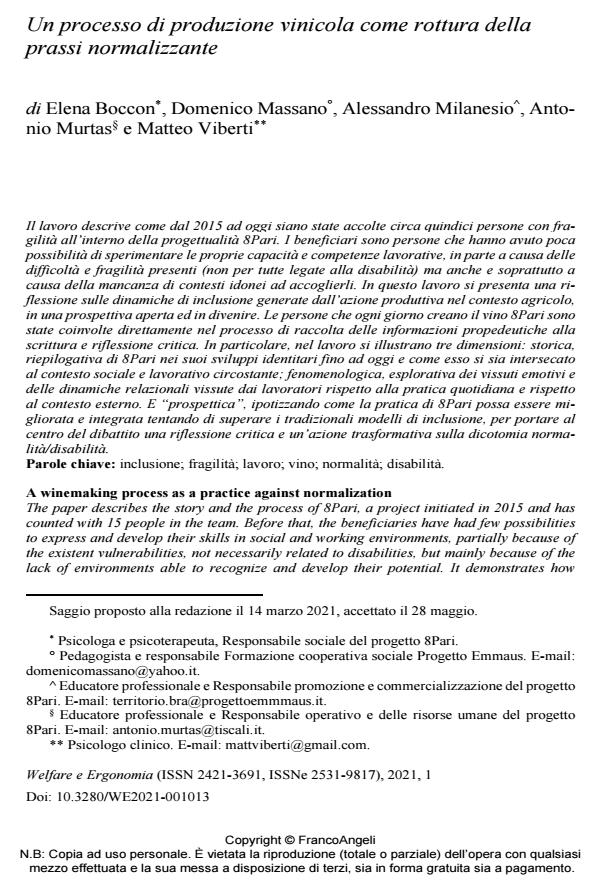A winemaking process as a practice against normalization
Journal title WELFARE E ERGONOMIA
Author/s Elena Boccon, Domenico Massano, Alessandro Milanesio, Antonio Murtas, Matteo Viberti
Publishing Year 2021 Issue 2021/1
Language Italian Pages 19 P. 149-167 File size 231 KB
DOI 10.3280/WE2021-001013
DOI is like a bar code for intellectual property: to have more infomation
click here
Below, you can see the article first page
If you want to buy this article in PDF format, you can do it, following the instructions to buy download credits

FrancoAngeli is member of Publishers International Linking Association, Inc (PILA), a not-for-profit association which run the CrossRef service enabling links to and from online scholarly content.
The paper describes the story and the process of 8Pari, a project initiated in 2015 and has counted with 15 people in the team. Before that, the beneficiaries have had few possibilities to express and develop their skills in social and working environments, partially because of the existent vulnerabilities, not necessarily related to disabilities, but mainly because of the lack of environments able to recognize and develop their potential. It demonstrates how working in the vineyard and in the cellar can generate inclusion, activating an open and dynamic process. Workers of 8Pari have been directly involved in the process of collecting data before the actual writing of the article. In particular, three dimensions were discussed: historical, which describes the evolution of 8Pari’s identity and its interactions with the surrounding social and working environments; phenomenological, which explores the emotions and relationships between workers in their daily routine, as well as their interaction with the social environment; and finally, the prospective dimension, which reflects on how 8Pari could be implemented and integrated, considering its limits and trying to improve the traditional inclusion models, in order to bring at the center of the debate the dichotomy normality/disability.
Keywords: inclusion; fragility; work; wine; normality; disability.
- Bandura A. (1997). Autoefficacia: teoria e applicazioni. Trento: Edizioni Erickson.
- De Giorgio A. e Massano D. (2020). Persona e disabilità. -- Retrieved from: https://www.rapportodiritti.it/persona-e-disabilita#capitolo.
- Foucault M. (1981). Sorvegliare e punire. Nascita della prigione. Torino: Einaudi.
- Goffman E. (2003). Stigma. L’identità negata. Verona: Ombre Corte.
- Istat (2019). Conoscere il mondo della disabilità. Persone, relazioni e istituzioni.
- Langensiepen K., relatrice (2021). Relazione sull’applicazione della direttiva 2000/78/CE del Consiglio che stabilisce un quadro generale per la parità di trattamento in materia di occupazione e di condizioni di lavoro alla luce della UNCRPD. (2020/2086(INI)). Commissione per l’occupazione e gli affari sociali. -- Retrieved from: https://www.europarl.europa.eu/doceo/document/A-9-2021-0014_IT.html.
- Mazzoli G. (2019). Vulnerabili a nome di tutti. In: Colleoni M., a cura di, Immaginabili risorse. Disabilità, cittadinanza, coesione sociale. Milano: FrancoAngeli.
- Massano D. (2021). Noi, persone con disabilità, siamo sistematicamente private del nostro diritto di lavorare. Persone e diritti., marzo 2021. -- retrieved from: https://personeediritti.altervista.org/noi-persone-con-disabilita-siamo-sistematicamente-private-del-nostro-diritto-di-lavorare/.
- Ministero del Lavoro e delle Politiche Sociali (2021). Relazione Sullo stato di attuazione della legge Recante norme per il diritto al lavoro Dei disabili (anni 2016, 2017 e 2018). -- Retrieved from: https://www.lavoro.gov.it/temi-e-priorita/disabilita-e-non-autosufficienza/focus-on/norme-sul-collocamento-al-lavoro-delle-persone-disabili/Documents/Relazione-diritto-lavoro-disabili-2016-2018.pdf.
- Oliver M. (1990). Politics of disablement. London: McMillan.
- Ramella Benna S. (2019). Psicologia sociale del Sé. La persona, i sentimenti e le relazioni. Torino: Nuova Trauben.
- Rodotà S. (2012). Il diritto di avere diritti. Roma-Bari: Laterza.
- Shakespeare T. (2014). Disabilità e società. Trento: Erickson.
- Sen A.K. (2001). Lo sviluppo è libertà. Perché non c’è crescita senza democrazia. Milano: Mondadori.
- Stiker H. (1982). Corps infirmes et sociètès. Parigi: Aubier Montaigne.
- Wolfensberger W. (1970). Il principio di normalizzazione e le sue implicazioni ai servizi psichiatrici. American Journal of Psychiatry, 127(3): 291-297.
- Vadalà G. (2013). La rappresentazione della disabilità tra conformismo e agire politico. In: AA.VV. Disability studies. Trento: Erickson.
Elena Boccon, Domenico Massano, Alessandro Milanesio, Antonio Murtas, Matteo Viberti, Un processo di produzione vinicola come rottura della prassi normalizzante in "WELFARE E ERGONOMIA" 1/2021, pp 149-167, DOI: 10.3280/WE2021-001013